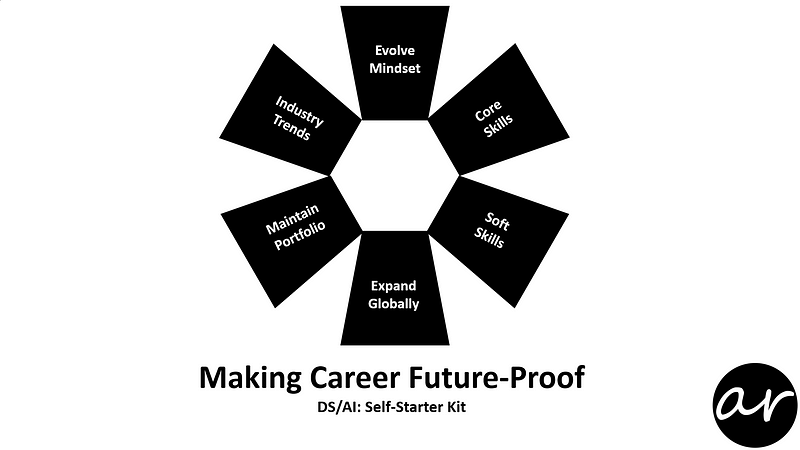Making Your ML/AI Career Future-Proof
 on [Unsplash](https://unsplash.com/search/photos/future-proof?utm_source=unsplash&utm_medium=referral&utm_content=creditCopyText)](https://cdn-images-1.medium.com/max/1200/1*5HbmG34OlWmWJsMs-tXjvA.jpeg)
This blog-post talks about how you can make you DS/AI career future proof. Lets first understand, why this is required? So what exactly does it mean to future proof your career?
Future proofing your career is simply taking the extra steps to prepare yourself for constant technology disruption, one that’s going to rely heavily on adaptability.
So rather than waiting for someone or technology to replace your labour, you’ll take a proactive approach to put yourself in a position where potential employers can’t afford to work with you.
Follow these six steps and you will secure your place in the workforce alongside disruption in technology instead of getting edged out:

Build ‘Evolve’ Mindset

Technology is only going to keep evolving, and it’s always going to get better. While you and I may not know exactly how we do know this change is inevitable. So as technology in the work environment evolves, so should the workforce.
People who are more adaptable and resilient will be the ones who will make the cut. They will also be the employees who are not threatened by technology disruption.
But how to become more resilient and adaptable?
First, you can prepare for the future like you are doing today and be ready to change course at a short notice. And two, when your environment begins changing, have an open mind about what this transition may bring — and be ready to take it head-on — instead of resisting it and sticking to your old habits.
One of the best ways to build the confidence necessary for this new technology-driven world is to level-up your digital skill-set.
Hone Core Skills
 on [Unsplash](https://unsplash.com/collections/1445889/essential-skills?utm_source=unsplash&utm_medium=referral&utm_content=creditCopyText)](https://cdn-images-1.medium.com/max/800/1*VAscktGgY5aT4-BuKhvn5Q.jpeg)
The technology disruption will also create a need for higher skill levels. You may have already witnessed the fact that having a college degree doesn’t make you stand out anymore. In fact, it is going to get redundant in the near future.
Organizations are emphasizing more on the core skills to do the job, the trick is to never stop learning and keep honing your core skills.
You should continue to acquire new relevant skills as well— especially ones which will be in demand.
The best way professionals can do this is by enrolling in online courses or you can also learn on your own. Like degrees, don’t focus on collecting training certificates but try to gain hands-on learning as much as you can.
Develop Soft Skills
 on [Unsplash](https://unsplash.com/collections/1276243/soft-skills?utm_source=unsplash&utm_medium=referral&utm_content=creditCopyText)](https://cdn-images-1.medium.com/max/800/1*z_8tiXSzygrOwlWXC0wxUw.jpeg)
You may be able to train a robot to automate the technical skills of your job, but soft skills such as leadership, communication, collaboration, and time management are still tasks only humans do well.
Since technology is not at the point where robots have the same emotional intelligence as humans, these soft skills are and will continue to be in high-demand.
The key is to consciously try to improve on your soft-skills. Fortunately, you can also hone your soft skills with online classes so you can be more proactive in this department too.
Maintain Digital Portfolio
 on [Unsplash](https://unsplash.com/search/photos/photos?utm_source=unsplash&utm_medium=referral&utm_content=creditCopyText)](https://cdn-images-1.medium.com/max/800/1*9NM7A9rdbJQUiyCiYkZX6Q.jpeg)
In one of the lessons earlier, we learnt how to build our portfolio. Most people wait until they are ready to find a new job to update the portfolio. But this is a huge mistake since you may forget what you’ve been up to, or worse, forget to mention a major milestone or achievement.
A better approach is to always update your projects and accomplishments as you work through them.
This guarantees that you never forget to highlight something and you’ll always have a list of your achievements on hand.
It is also a great idea to keep your performance reviews here, both the good ones and the bad. You can always refer back to these anytime you need a pick-me-up or if you want to narrow down your specific areas needing improvement.
Expand Network Globally
 on [Unsplash](https://unsplash.com/search/photos/networking?utm_source=unsplash&utm_medium=referral&utm_content=creditCopyText)](https://cdn-images-1.medium.com/max/800/1*YMYV5DQd21fgF5S-m6QFOg.jpeg)
Couple the evolution of technology with the rise in telecommuting, remote work, and networking sites like LinkedIn, and you will quickly find connections outside of your local network.
To stay in touch with these global members of your team, you will want to become a pro at virtual project management tools like Trello and messaging platforms like Slack.
Apart from your team members, become more familiar with the geographic regions that pertain to your job by reaching out to professionals in those countries too.
If you get an opportunity to relocate or take on an international project, go for it and give you a leg up on your competition, it will go a long way to future-proofing your career too.
Monitor Industry Trends
 on [Unsplash](https://unsplash.com/search/photos/trends?utm_source=unsplash&utm_medium=referral&utm_content=creditCopyText)](https://cdn-images-1.medium.com/max/800/1*Cc8exApLG6iB4ftp_l_qBQ.jpeg)
Understanding the future of your industry is a giant factor in how well you can truly future proof your career. Essentially, there’s no point specializing in a language/tools that may be completely redundant in a few years.
The tasks most at risk are those requiring low-level repetitive tasks each day. So if that description matches your current position, it is time to add more skills to the fore and prepare for the redundancy in future.
But remember, an increased use of technology in the workplace doesn’t always mean your job is at risk.
Rather, it could mean you will just need to know how to use upcoming technology/framework as a way to potentially do your job better or more efficiently.
Stay abreast with industry news to see if it impacts only specific to your company or your entire industry as a whole. If you see an industry-wide trend, that’s a good sign you should learn those new skills and consider switching career paths.
Either way, follow these steps and you’ll ensure your career — both now and in the future — is set up for success, even as technology disruption and automation move in.
Ankit Rathi is an AI architect, published author & well-known speaker. His interest lies primarily in building end-to-end AI applications/products following best practices of Data Engineering and Architecture.
Why don’t you connect with Ankit on YouTube, Twitter, LinkedIn or Instagram?
If you have any questions or comments, click the "Go To Discussion" button below!